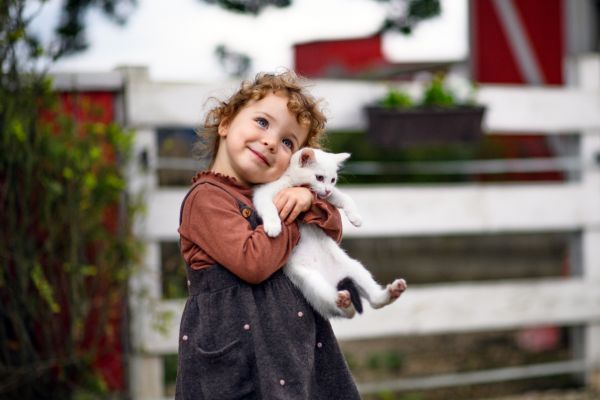Welcome to “Essential Kitten Care Tips,” your guide to nurturing a new feline friend. Discover vital insights into nutrition, play, and early socialization for your adorable kitten.
Understanding Your Kitten’s Nutritional Needs Early

Firstly, proper nutrition is crucial for kittens. Initially, they require a diet rich in protein to support rapid growth. Additionally, essential nutrients like taurine are vital for heart and eye health. As they grow, transitioning to solid food becomes necessary. Moreover, always ensure fresh water is available. This early dietary foundation sets the stage for a healthy, vibrant life, preventing future health issues and fostering optimal development.
Secondly, play is integral to a kitten’s development. Furthermore, it’s not just about fun; it’s about learning essential skills. Interactive toys stimulate their minds, while scratching posts protect your furniture and aid in claw health. Additionally, playtime strengthens the bond between you and your kitten. Moreover, it’s a way to teach gentle play, avoiding aggressive behaviors. Regular play sessions contribute to their physical and emotional well-being, ensuring a well-adjusted adult cat.
Lastly, early socialization is key. Introducing your kitten to various stimuli, including people, pets, and environments, is essential. Moreover, this exposure helps them become well-adjusted adults. Additionally, gentle handling by different people fosters trust and confidence. Remember, positive experiences during this formative period are crucial. Furthermore, consider enrolling them in a kitten socialization class. This early investment in socialization paves the way for a confident, sociable, and adaptable feline companion.
Creating a Safe, Stimulating Environment for Kittens
Creating a safe environment for your kitten is paramount. Firstly, kitten-proof your home to prevent accidents. Remove or secure potentially dangerous items like loose wires or small objects they might swallow. Additionally, provide a quiet, comfortable resting area. Moreover, a stimulating environment with various toys encourages exploration and learning. This not only keeps them entertained but also aids in their cognitive development. Furthermore, a safe and engaging space fosters a sense of security and curiosity in your kitten.
In addition to safety, consider the importance of routine. Establishing a consistent schedule for feeding, play, and rest helps your kitten feel secure. Furthermore, routine veterinary visits are crucial for vaccinations and health checks. Additionally, introduce grooming early, including brushing and nail trimming. This not only maintains their coat and claw health but also strengthens your bond. Moreover, consistent routines and gentle grooming practices help your kitten adapt to various care activities with ease.
Lastly, remember that kittens are highly social animals. Therefore, spending quality time with them is essential. Engage in interactive play sessions daily. Furthermore, gentle petting and cuddling help build trust and affection. Additionally, if possible, consider adopting two kittens together for companionship. This not only provides them with a playmate but also aids in their social development. Moreover, having a feline companion can reduce separation anxiety and provide endless entertainment and social interaction.
Essential Kitten Care Tips for Healthy Growth
Understanding your kitten’s health needs is crucial. Firstly, schedule regular veterinary check-ups to monitor their growth and development. Additionally, vaccinations and parasite control are essential for preventing diseases. Moreover, be attentive to their dental health; start teeth brushing early. This not only prevents dental issues but also acclimates them to the process. Furthermore, observe their behavior for any signs of illness. Prompt attention to health concerns ensures your kitten grows into a healthy, happy adult cat.
Training and discipline are also key components of kitten care. Start litter training as soon as they arrive. Furthermore, establish clear boundaries and use positive reinforcement techniques. Additionally, discourage unwanted behaviors gently but firmly. Moreover, provide scratching posts to protect your furniture and satisfy their natural instincts. Consistent training and positive reinforcement foster good habits and mutual respect. Furthermore, this approach strengthens your bond and ensures a harmonious coexistence.
Lastly, consider the emotional well-being of your kitten. Provide a nurturing and loving environment. Furthermore, kittens thrive on affection and attention. Spend quality time bonding through play and cuddles. Additionally, provide a variety of stimuli, like different textures and sounds, to enrich their environment. Moreover, a stable and loving home environment plays a significant role in their emotional development. A well-cared-for kitten is more likely to grow into a well-adjusted, affectionate adult cat.
Balancing Playtime and Rest for Kittens
Balancing playtime and rest is vital for kittens. Firstly, engage them in regular, interactive play sessions. This not only stimulates their mind but also helps burn off excess energy. Additionally, use a variety of toys to keep them interested and active. Moreover, playtime is an excellent opportunity for bonding and teaching them social cues. Furthermore, ensure they have quiet, comfortable spots for rest. Adequate rest is crucial for their growth and overall well-being.
In addition to play, proper nutrition plays a significant role in their energy levels. Feed them a balanced diet formulated for kittens. Furthermore, consider small, frequent meals to suit their fast metabolism. Additionally, always provide fresh water to keep them hydrated. Moreover, observe their eating habits for any changes, as this can indicate health issues. A well-fed kitten is energetic, curious, and ready to explore. Furthermore, a balanced diet supports their rapid growth and development.
Lastly, understand the importance of socialization and exposure to various experiences. Expose them to different people, pets, and environments in a controlled manner. Furthermore, this helps them become well-adjusted and less fearful. Additionally, gentle, positive experiences during these interactions are crucial. Moreover, consider enrolling them in kitten socialization classes for a structured approach. A well-socialized kitten is more likely to develop into a confident, sociable adult cat.
Effective Litter Training for Your Kitten
Effective litter training is a key aspect of kitten care. Firstly, choose an appropriate litter box and litter type. It should be easily accessible and comfortable for your kitten. Additionally, place it in a quiet, private area to encourage use. Moreover, gently guide them to the litter box after meals and naps. Consistency and patience are crucial during this training phase. Furthermore, positive reinforcement helps them associate the litter box with a positive experience.
In addition to the litter box, cleanliness is essential. Regularly clean the box to maintain hygiene and encourage its use. Furthermore, avoid using strong-smelling cleaning products as they may deter your kitten. Additionally, observe their bathroom habits for any irregularities, as changes can indicate health issues. Moreover, having multiple litter boxes in different locations can be helpful, especially in larger homes. A clean, accessible litter box ensures a hygienic environment for both your kitten and your home.
Lastly, be patient and understanding during litter training. Some kittens may take longer to learn than others. Furthermore, accidents are a normal part of the learning process. Avoid punishing your kitten for mistakes; instead, gently redirect them to the litter box. Additionally, consider using kitten-attracting litter to ease the training process. Moreover, consistent, gentle guidance reinforces good bathroom habits. A well-trained kitten becomes a well-mannered adult cat, making for a harmonious living situation.
Introducing Your Kitten to Other Pets
Introducing your kitten to other pets requires patience and care. Firstly, start with short, supervised interactions. This not only ensures safety but also allows pets to gradually get accustomed to each other. Additionally, observe their body language closely for signs of stress or aggression. Moreover, provide separate spaces for each pet to retreat if needed. Gradual, positive introductions foster peaceful coexistence. Furthermore, rewarding calm behavior encourages acceptance and reduces tension between pets.
In addition to supervised interactions, scent swapping can be beneficial. Exchange bedding or toys between your kitten and other pets. This allows them to familiarize themselves with each other’s scent. Furthermore, maintain a routine for all pets to avoid jealousy or competition. Additionally, ensure each pet receives equal attention and care. Moreover, patience is key; some pets may take longer to adjust than others. A thoughtful, gradual introduction process promotes harmony in a multi-pet household.
Lastly, consider the personalities of your pets. Some may be more receptive to new companions than others. Furthermore, never force interactions; allow pets to approach each other in their own time. Additionally, provide a safe, escape-proof space for your kitten. This ensures they can explore and interact at their own pace. Moreover, continuous monitoring and adjustment based on their responses are essential. A carefully managed introduction sets the foundation for a lifelong friendship among pets.
Regular Veterinary Care for Kitten Wellness

Regular veterinary care is essential for your kitten’s wellness. Firstly, schedule initial check-ups and vaccinations. This not only protects them from common diseases but also establishes a health baseline. Additionally, discuss spaying or neutering with your vet. Moreover, these visits are opportunities to ask questions and get professional advice on care and nutrition. Regular vet check-ups ensure your kitten’s health is monitored and any concerns are addressed promptly, contributing to a long, healthy life.
In addition to vaccinations, consider preventative care. Regular flea, tick, and worm treatments are crucial. Furthermore, discuss the best options with your vet, as young kittens have specific needs. Additionally, monitor your kitten’s growth and development. Regular weigh-ins help track their progress. Moreover, be attentive to any changes in behavior or appetite, as these can be early signs of health issues. Preventative care and early detection of problems are key to maintaining your kitten’s health.
Lastly, dental care is an often-overlooked aspect of kitten wellness. Start dental hygiene practices early. Furthermore, use specially designed kitten toothbrushes and toothpaste. Regular brushing prevents dental diseases and builds good habits. Additionally, your vet can provide guidance on dental care and check for any issues during visits. Moreover, healthy teeth and gums contribute to overall health. A comprehensive approach to veterinary care, including dental health, ensures your kitten grows up strong and healthy.
Essential Kitten Care Tips for Happy Cats
One of the essential kitten care tips is understanding their emotional needs. Firstly, provide a nurturing environment filled with love and patience. This not only helps your kitten feel secure but also aids in their emotional development. Additionally, spend quality time bonding through play and affection. Moreover, kittens require attention and companionship to thrive. A loving, attentive approach ensures your kitten grows into a happy, well-adjusted cat, enriching your life with their presence.
In addition to emotional care, environmental enrichment is crucial. Create a stimulating environment with climbing structures, hiding spots, and toys. This not only keeps them physically active but also mentally engaged. Furthermore, window perches offer a view of the outside world, satisfying their curiosity. Additionally, interactive toys that mimic hunting behaviors provide mental stimulation. Moreover, a varied and enriching environment prevents boredom and promotes healthy development, contributing to their overall happiness and well-being.
Lastly, consider the long-term aspects of kitten care. As they grow, their needs will evolve. Stay informed about each life stage and adjust care accordingly. Furthermore, continue regular veterinary check-ups and maintain a balanced diet. Additionally, keep engaging them in play and socialization activities. Moreover, a consistent, evolving approach to care ensures your kitten matures into a healthy, content adult cat. Remember, a well-cared-for kitten is a joy for years to come.
Teaching Your Kitten Basic Commands and Tricks”
Teaching your kitten basic commands and tricks is not only fun but also beneficial for their development. Start with simple commands like ‘sit’ or ‘stay.’ Use treats and positive reinforcement to encourage learning. Furthermore, training sessions strengthen your bond and enhance their cognitive abilities. Additionally, keep sessions short and enjoyable to maintain their interest. Moreover, consistent, patient training lays the foundation for a well-behaved adult cat, making cohabitation more harmonious and enjoyable.
In addition to basic commands, introduce your kitten to leash training. This can be a safe way to explore the outdoors together. Start by getting them comfortable with a harness indoors. Furthermore, use treats and positive reinforcement to build positive associations. Gradually increase exposure to outdoor environments. Additionally, always ensure their safety and comfort during these sessions. Moreover, leash training expands their world, providing new stimuli and experiences, which is beneficial for their overall well-being.
Lastly, consider clicker training as a method to teach tricks and commands. The clicker sound acts as a marker for desired behavior, followed by a reward. This clear communication aids in faster learning. Furthermore, it’s a fun and engaging way to interact with your kitten. Additionally, it can be used to address unwanted behaviors gently and effectively. Moreover, training enhances mental stimulation and provides a constructive outlet for their energy, promoting a well-rounded and contented cat.
Ensuring Proper Hydration and Health for Kittens
Ensuring proper hydration is crucial for your kitten’s health. Firstly, always provide fresh, clean water. Kittens may prefer running water; consider a cat water fountain. Additionally, monitor their water intake, as changes can indicate health issues. Moreover, wet food can supplement their hydration needs. Proper hydration supports kidney function and overall health. Furthermore, a well-hydrated kitten is more energetic and playful, contributing to their physical and emotional well-being.
In addition to hydration, regular grooming is important. Grooming not only keeps their coat healthy but also provides an opportunity to check for any skin issues or parasites. Start grooming routines early to acclimate them. Furthermore, regular brushing reduces hairballs and shedding. Additionally, ear cleaning and nail trimming are important aspects of grooming. Moreover, a well-groomed kitten is more comfortable and less prone to health issues, ensuring they remain happy and healthy.
Lastly, be aware of common kitten health issues. Regular vet visits help identify and address any concerns early. Furthermore, be vigilant about symptoms like lethargy, loss of appetite, or unusual behavior. Additionally, keep up with vaccinations and preventative treatments. Moreover, a healthy diet, exercise, and mental stimulation play a significant role in preventing health problems. Proactive care and attention to their health needs ensure your kitten grows into a robust and joyful adult cat.
In Summary
In conclusion, “Essential Kitten Care Tips” encompass a range of practices crucial for nurturing a healthy, happy feline companion. From providing balanced nutrition and regular veterinary care to ensuring emotional well-being and proper socialization, each aspect plays a vital role. Furthermore, consistent training and grooming routines establish a strong foundation for their lifelong health and happiness. Moreover, the joy and companionship a well-cared-for kitten brings to a home are immeasurable.
Encouragingly, the journey of raising a kitten is filled with rewarding moments and learning opportunities. Engaging in interactive play, observing their curious explorations, and witnessing their development into confident adult cats are experiences to cherish. Additionally, the bond formed through this journey is unique and profound. Moreover, as responsible pet owners, our commitment to their care reflects our love and respect for these wonderful creatures.
We invite you to continue exploring the world of kitten care and share your experiences. Visit our blog for more insights and tips, and feel free to leave comments or questions. Additionally, consider joining our community of fellow cat enthusiasts. Your interaction enriches our collective knowledge and passion for feline care. Let’s continue to learn, share, and celebrate the joy of raising kittens together.
III. Frequently asked questions about pet life stages
- Is it safe to feed dog food to a cat or vice versa?It is not recommended to feed dog food to a cat or vice versa, as each type of food is formulated to meet the specific nutritional needs of each species.
- How can you calculate a dog or cat's "human age"?A dog or cat's "human age" can be calculated using specific formulas that consider the pet's size and actual age, but these formulas are only estimates.
- What are the benefits of genetic testing for pets?Genetic testing can offer insights into disease predisposition, breed characteristics, and guide the most appropriate care and management for the pet's health.
- How can you identify and prevent joint diseases in pets?Joint diseases can be identified by signs such as movement difficulty, pain when touched on the joints, and reluctance to jump or play. Prevention includes maintaining an ideal weight, regular exercise, and supplementation if necessary.
- How has the life expectancy of pets changed in recent decades?The life expectancy of pets has increased due to advancements in veterinary medicine, nutrition, and greater awareness of preventive care and animal welfare.
- What veterinary tips are essential for feeding pets at each life stage?Tips include providing a balanced diet suitable for the life stage, considering special health needs, and adjusting portions to prevent overweight.
- How can proper nutrition influence the effectiveness of vaccines in puppies?Balanced and nutrient-rich nutrition can strengthen the immune system of puppies, enhancing their response to vaccines.
- How can you determine a cat's age in human years?A cat's age in human years can be estimated by considering that the first two years correspond to about 24 human years, with each subsequent year equating to approximately four human years.
- What are the signs that your dog is aging?Signs include decreased energy, the appearance of white hair, movement difficulty, behavioral changes, and possible age-related health issues.
- What is the ideal toy for each stage of a dog's life?Puppies may benefit from teething toys, adult dogs may need durable chewing toys and interactive toys for mental stimulation, and senior dogs may prefer softer, easy-to-handle toys.
- Toggle TitleToggle Content

Join Dan Morgan at dwfocus.com, your hub for ‘4 paws and owners’ wisdom! Explore a world where pet care meets expert insights, crafted by Dan, a seasoned vet with a heart for animals. Engage with stories, tips, and advice that every pet owner needs. From playful pups to graceful cats, Dan Morgan guides you through the joys and challenges of pet parenting. Embrace your love for pets with Dan’s expert guidance on dwfocus.com. #4PawsAndOwners #DanMorganPetExpert #dwfocus







